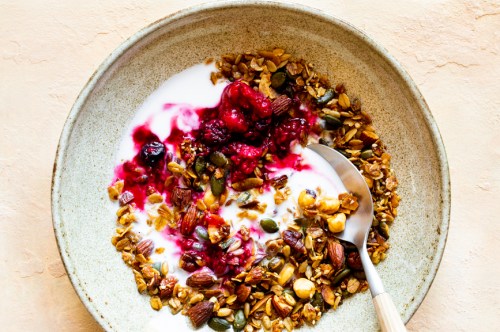The 6 Top Types of Plant-Based Protein To Eat for Bone Strength and Density, From an RD
A registered dietitian shares the top types of plant-based protein to eat for bone strength and density over time.

In the quest to age well, there are lots of boxes we should check to ensure we are, and stay, healthy from the inside out. From gut health and immune function to cardiovascular health and cognition, we’re fortunate in that food can absolutely be a type of preventative medicine. The same goes for bone health—which might not get as much airtime as the aforementioned areas of well-being—but you’ll do your skeleton a solid by being proactive.
Experts in This Article
Sarah Wagner, MPH, RD, LD is a clinical registered dietitian at Memorial Hermann in Houston, Texas.
To help you sit and stand strong and tall as the years pass, aim to enrich your diet with some of the best plant-based protein sources for stronger bones. Better yet, they’re primed to help you score pro-aging health wins across the board.
Why protein is crucial for bone health as we age
When it comes to boosting bone health, calcium and vitamin D tend to steal the limelight—but protein is involved in the equation, too. “We usually think of protein for muscles or ‘bulking up,’ but it really is involved in almost every process going on in our bodies and is crucial for bone health,” says Sarah Wagner, MPH, RD, LD, a clinical registered dietitian at Memorial Hermann in Houston, Texas. “Proteins contribute largely to the structure of bone, and protein and exercise go hand-in-hand to help maintain bones as we age.”
The power duo of diet and weight-bearing exercise, she continues, increases muscle mass and bone density so bones are less likely to fracture. Protein, calcium, and vitamin D also happen to assist each other in some pretty major ways. “Calcium is the primary mineral that makes up bones within the protein structure,” Wagner continues. Meanwhile, vitamin D aids the absorption and use of calcium. (Read: It’s all about the team effort.)
Moreover, keeping tabs on your daily protein intake is crucial—especially for older adults, whom Wagner says are less likely to eat enough protein on a consistent basis. (Tip: For an estimate of how much protein you should aim for daily, multiply your weight in kilograms by 0.8. Athletes may need to boost the multiplier to 1.2 to 2.0, depending on their routines and goals.) “It can take some intentional effort to include protein-rich and calcium-rich foods in your diet for optimal bone health,” she says, but the intel below can simplify the endeavor.
The best plant-based protein sources for bone health
Before we dive into the top plant-based proteins for stronger bones, Wagner reminds us that they’re made of amino acids. “Our bodies take the amino acids we eat (from protein) and rearrange them as needed for different processes,” she shares. Per a 2019 study published in the journal Bone, certain amino acids may be especially beneficial for bone health “through promoting osteoblast growth and differentiation, improving collagen formation, and selectively acting as signalling molecules in bone cells.” In this study, the authors found that higher serum concentrations of valine, leucine, isoleucine, and tryptophan were associated with less BMD hip decline.
Another 2016 study notes that higher protein intake from vegetables in particular is associated with higher bone mineral density (BMD), and that the amino acids alanine and glycine may be especially beneficial for bone health. Meanwhile, a 2022 review published in the International Journal of Molecular Sciences noted that all essential amino acids (aka the ones that the body doesn’t make itself) have been proven to increase bone mass and exert positive effects on aging bones.
At any rate, so long as you get all amino acids, you’ll be well equipped to cover your bone health-boosting bases. While the body requires each one, most complete proteins (i.e., those with all amino acids) happen to be from animal sources, so dietary diversity is the name of the game for plant-based eaters. “The best way to make sure you’re giving your body all the building blocks it needs for strong bones is to eat a variety of protein sources,” Wagner shares.
Top plant-based protein sources for bone health:
- Tofu
- Beans
- Lentils
- Nuts
- Quinoa
- Seeds
If you follow a plant-based diet, chances are these protein-rich foods are already in your rotation, so there isn’t too much you’ll need to modify. (Better yet, many of these categories are pretty broad. Switch things up to your heart and palate’s content.) But if you come up short on the calcium front, Wagner suggests paying greater attention to plant-based sources of the mineral. “You can easily find plant-based milks or orange juice that are fortified with calcium,” she says. Leafy greens also pack this all-important mineral for bone health—as do protein-rich tofu and beans, offering a one-and-done deal for sturdy bones.
Sign Up for Our Daily Newsletter
Get all the latest in wellness, trends, food, fitness, beauty, and more delivered right to your inbox.
Got it, you've been added to our email list.










